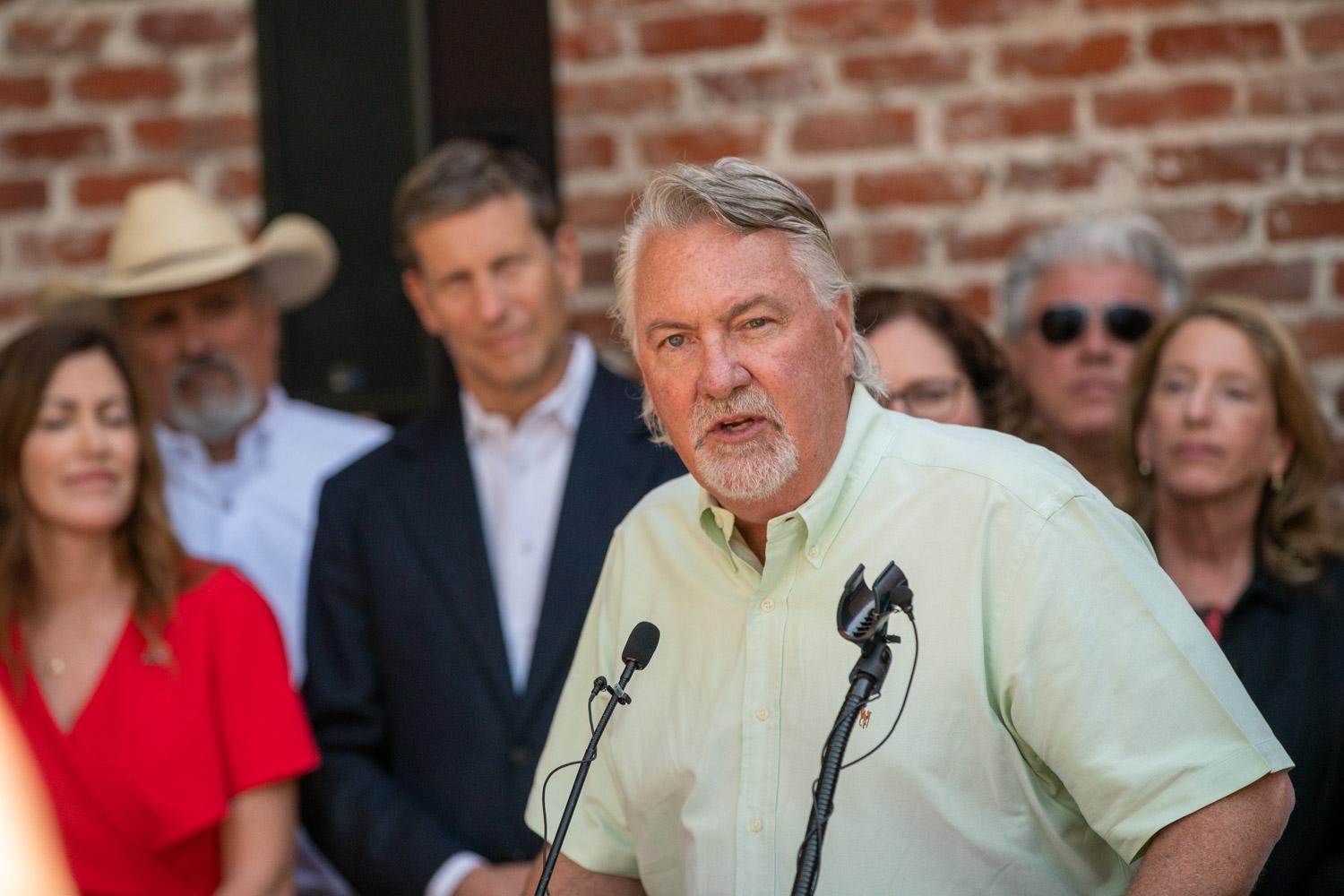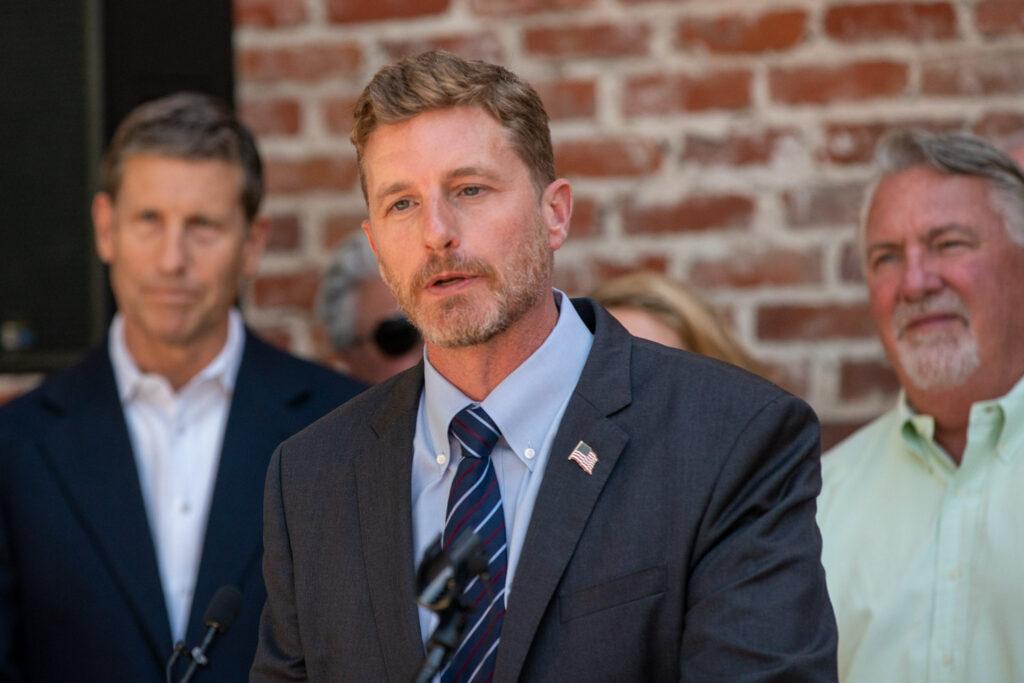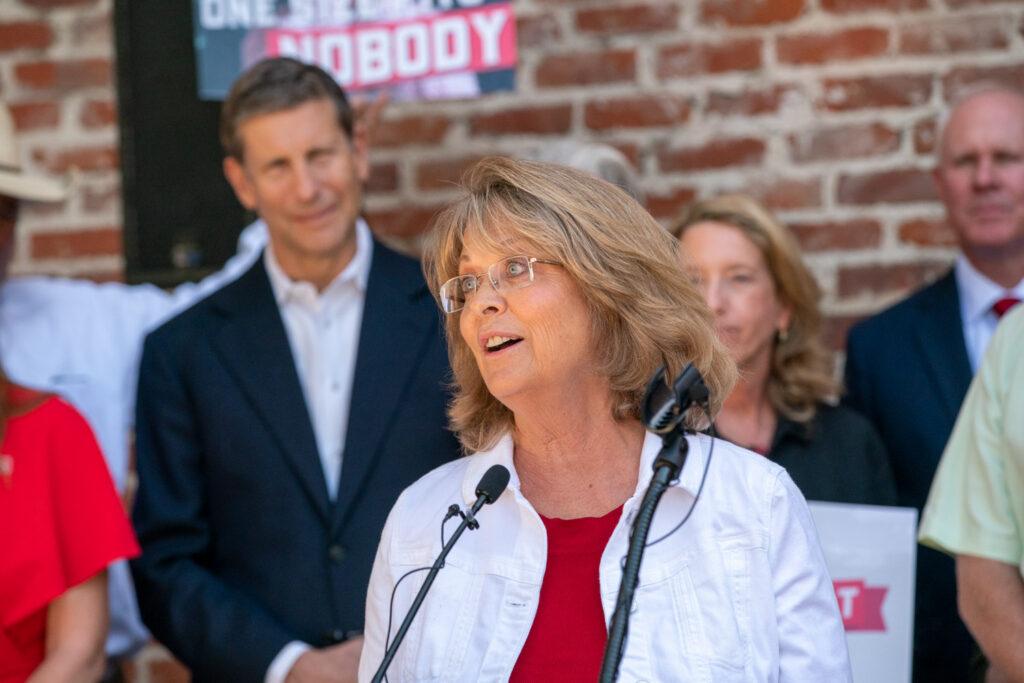
As Democrats celebrated a victory with the Senate passage of the Inflation Reduction Act, some of Colorado’s highest-profile Republicans argued Tuesday that it’s a bad deal for Coloradans.
Republican candidates and party leaders gathered Tuesday to launch into the final three months of the midterm election season and took the chance to repudiate the Democrats’ federal legislation on health care, climate, and taxation.
“It goes against everything that we believe in here in Colorado and trying to make it more affordable,” Senate candidate Joe O’Dea said of the IRA. “I don't know why they're calling it an Inflation Reduction Act … It’s a tax.”
The imminent passage of the bill has given Democrats a feeling of momentum after months of rising concern over inflation and a failure to achieve many of President Joe Biden’s priorities.
The bill would spend about $433 billion to address climate change and shift the country away from fossil fuels. It would be paid for with new taxes on corporations, but also by beefing up enforcement of the existing tax code.
The bill includes some $80 billion to boost the IRS, including by hiring more agents to audit people and corporations. Supporters of the bill say that new workforce will be aimed at ensuring wealthy people and businesses aren’t avoiding their tax obligations. But O’Dea and other Republicans argue it and other measures will amount to more tax enforcement against the middle class.
“If they have to hire 87,000 IRS agents to collect that tax from working Americans, it's a tax,” O’Dea said.

Claims about IRS hiring situation might not be entirely true
The claim of 87,000 new IRS “agents” has circulated widely among Republicans and some news publications, but administration officials claim it’s not accurate.
The agency has outlined plans to hire more than 80,000 employees over a decade with new funding, but "the majority” of those will be filling open vacancies, according to a Treasury Department spokesperson. Many of the employees will work in areas like customer service, not enforcement, the publication reported. But about $46 billion of the infusion will go toward tax enforcement, according to The Washington Post.
"The majority of new employees will replace the standard level of staff departures over the next few years. New staff will be hired to improve taxpayer services and (add) experienced auditors who can take on corporate and high-end tax evaders, without increasing audit rates relative to historical norms for people earning under $400,000 each year," read a statement from the Treasury Department to CPR News.
In a letter to the Senate, IRS commissioner Charles Rettig wrote that the new spending is “absolutely not about increasing audit scrutiny on small businesses or middle-income Americans.”
New auditors will focus on “(l)arge corporate and high-net-worth taxpayers (that) often engage teams of sophisticated representatives who pursue unsettled or sometimes questionable interpretations of tax law,” the letter continued.
Staffing levels at the IRS are 17 percent lower today than in 2010, with an even sharper drop for enforcement employees, The Washington Post reported. A deputy Treasury Department Secretary told NPR that understaffing and old technology mean the agency is missing out on hundreds of billions in uncollected taxes this year.
O’Dea’s spokesman, Kyle Kohli, said it was improbable that the agency could find that much new revenue without hitting the middle class.

US House candidates also took aim at the Inflation Reduction Act
GOP House candidates are also critical of the Democratic bill. Weld County Commissioner Barbara Kirkmeyer, the candidate in CO-8, and Eric Aadland, who’s running in CO-7, both said if elected they’d want to revisit the bill, including its provisions regarding prescription drug pricing.
Under the Inflation Reduction Act, Medicare would use its market power to negotiate lower rates on some prescription drugs and would penalize companies that raise prices more than the rate of inflation. Kirkmeyer worries it will lead to reduced investment in new medicines. “Basically, they're not going to make new drugs. They may not even produce certain drugs,” she said.
Aadland added he does want transparency in drug pricing, but thinks the costs could be addressed by stopping “onerous government regulation of companies.”
As for the efforts to tackle climate change in the bill, Aadland argued it doesn’t include the “right kind of energy policy.” He said the subsidies and tax incentives for people to transition to renewable energy, such as help buying electric vehicles and solar panels, would only really benefit the wealthy individuals.
The bill is projected to lower emissions 40 percent below 2005 levels by 2030. It would also fine companies for exceeding methane emissions from oil and gas drilling. But in a concession to oil and gas states, the bill would also require the administration to continue to hold new oil and gas leasing auctions.
Beyond their specific complaints, Republicans hammered the bill for not doing what the title says it would: reduce inflation. The Congressional Budget Office’s analysis of the bill shows it would have little effect on inflation in the near term, but experts add if the bill can reduce health care costs, it could hold down inflation in the long term.

Republican candidates want to tie their Democratic rivals to Biden
The GOP press conference went far beyond the new Democratic legislation. Also speaking were gubernatorial candidate Heidi Ganahl; attorney general candidate John Kellner; secretary of state candidate Pam Anderson; education board candidate Dan Maloit; and treasurer candidate Lang Sias.
They generally sought to tie Colorado Democrats to Biden, who remains deeply unpopular. They blamed the party, which has held Colorado in Colorado for the past four years, for inflation, crime and the new fees that Democrats created to pay for priorities like transportation.
“(Governor) Jared Polis has decided to fight for Joe Biden and the Democrat failed policies. He's fighting for his own political career, for his own American Dream to be president and destroy our country — just like he's destroying Colorado,” Ganahl said.
In a statement, Colorado Democratic Party Chair Morgan Carroll said her party has offered “real solutions” on the state and federal levels. Democrats have touted that they are “saving people money” through measures like paying out TABOR refunds several months early and temporarily delaying a new gas fee.
In her statement, Carroll said the GOP was pursuing a far-right agenda of “taking away the freedom from women to make their own decisions, denying climate change, and growing tax cuts that benefit the wealthy and make things tougher for working families.”
Election day is Nov. 8, but ballots will be mailed almost a month early.
CPR’s Caitlyn Kim contributed to this reporting.
Editor's note: This article was update on Aug. 9 with comment from the Department of the Treasury.









